
9 minute read
New Year’s celebrations all over the world
from Engleski 1
76
READING NEW YEAR’S CELEBRATIONS ALL OVER THE WORLD
Advertisement
Talk about the following: • How do people usually celebrate New Year? • What is the general feeling among people on New Year’s Day?
New York is well known for its New Year celebrations and people from all over America come to Times Square, a tradition since 1906. A huge, brightly-lit ball made of glass descends as the clock strikes 12 on New Year’s Eve. It looks like a bright star as it falls through the darkness. When it reaches the ground, people throw tiny pieces of colourful paper into the air, cry out ‘Happy New Year’ and sing the traditional New Year song. Those who are not able to get to Times Square can watch on television.
Track 21

Fireworks are also a typical part of American celebrations as the midnight sky on New Year’s Eve is lit up by beautiful firework displays. In the past, it was believed that ghosts were afraid of light and noise, and fireworks resulted from the tradition of frightening evil forces away.
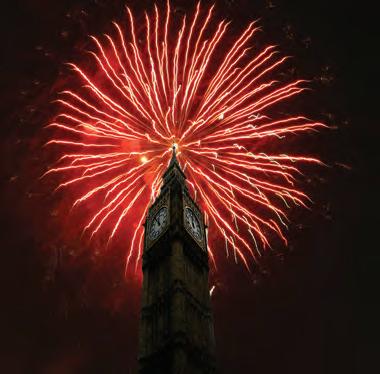
In England, crowds of people gather on Trafalgar Square to hear the chimes of London’s Big Ben announce the arrival of the New Year. Gathering on the main squares in towns has also become a tradition in Serbia. People listen to music, sing, dance and enjoy firework displays.
In Australia, New Year’s Day is a public holiday and many people have picnics and camp out on the beach. It is a day for outdoor activities, such as rodeos, picnic races and surf carnivals.
When the clock strikes midnight, the Spanish eat 12 grapes to bring good luck for the next 12 months. Sometimes the grapes are washed down with wine.
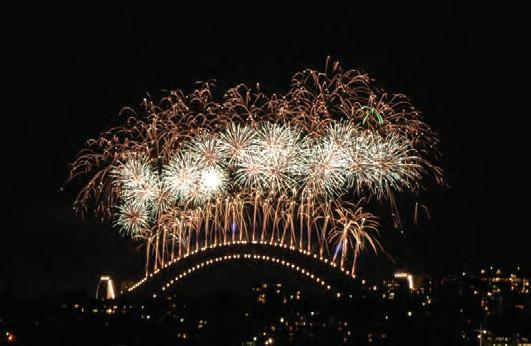
The Celebration of the Buddhist New Year is an occasion of great joy. People spray water on whoever they meet in the streets – it doesn’t matter if it is a friend or a stranger.
Glossary
to descend – come down display – show, presentation
COMPREHENSION
1 Finish the sentences according to the information in the text.
1. In New York, at Times Square, people watch a _______________________________________. 2. According to the traditional belief, fireworks ________________________________________. 3. Trafalgar Square is a place where _________________________________________________. 4. In Australia, on New Year’s Day people organize _____________________________________. 5. The Spanish eat 12 grapes _______________________________________________________.
VOCABULARY
a cb
1 Match the highlighted words from the text to their explanations below.
1. __________ - making you feel afraid 2. __________ - a ringing sound made by a bell or clock 3. __________ - tell people something officially, especially about a decision or plan 4. __________ - to come or go down from a higher to a lower level 5. __________ - a special event, ceremony or celebration; a time when something happens
2 Use the highlighted words in their correct form to complete the sentences below.
1. I’m saving this bottle of champagne for a special _____________. 2. We are pleased to ____________ that all five candidates were successful. 3. It’s ______________ to think it could happen again. 4. I heard the clock _____________ and turned the lights on. 5. She ______________the stairs slowly and went out without looking at us.
SPEAKING
New Year’s celebrations – Class discussion Talk about the following:
customs related to the celebration of New Year
presents we buy for friends and members of our families how you celebrated the last New Year the atmosphere in your town
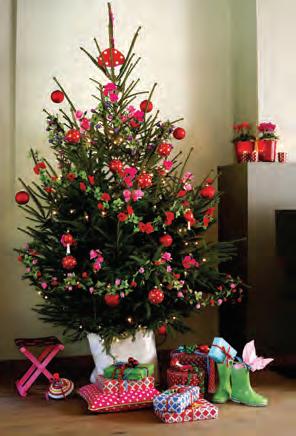
77
WORD FORMATION
Make nouns from the verbs in brackets to complete the sentences.
1. The _________________ of their engagement came as a surprise. (announce) 2. There was a big _____________ for Helen’s birthday organized on the beach. (celebrate) 3. An ______________ can be a business or some other kind of institution. (establish) 4. The new project is nearing its________________. (complete) 5. She telephoned me yesterday but made no _____________ to see me. (arrange) 6. We devoted several days to the ______________ of that magnificent site. (explore) 7. He expressed his ________________for what they had done for his family. (appreciate)
FOCUS ON
ADJECTIVES and PREPOSITIONS
Here are a few common expressions with particular prepositions:
afraid of made of jealous of aware of capable of fond of proud of angry/furious with someone angry about something happy about concerned about worried/upset about well-known/famous for responsible for keen on similar to married to rude to good/bad at interested in
Fill in the gaps with the correct prepositions.
1. The mayor is particularly keen _______ building a new theatre. 2. You shouldn’t get upset __________ little things. 3. I’m hopeless _______ maths. 4. Your bag is very similar _______ mine. 5. Ashley is extremely proud _______ her students’ rapid progress. 6. Karl was very rude ________ the waiter.
He should be ashamed ________ himself! 7. Steve’s not very good _______ remembering people’s names.
78
GRAMMAR
THE OMISSION OF ARTICLES
• We don’t use an article with the following nouns used in a general sense. – plural nouns – Women live longer than men. – uncountable nouns – Heating and electricity cost a lot. – abstract nouns – He writes about love and death. Note: We use the with plural nouns and uncountable nouns when we mean particular people or things.
The women in our family are taller than the men. The weather in England was good, but the food wasn’t.
• We don’t use an article before: personal names, the names of towns, most countries, continents, single mountains, lakes, squares, streets, parks, days, months, festivals, meals, school subjects, languages (when the word language is not mentioned), etc. However, there are often exceptions to this rule. • No article is needed before bed, church, court, hospital, prison, school, college, university, etc. when these are used for their primary purpose. • Articles are not needed in some expressions like to/at sea, to/at/out of work, in/out of town, etc. For more information, see the Grammar summary.
PRACTICE
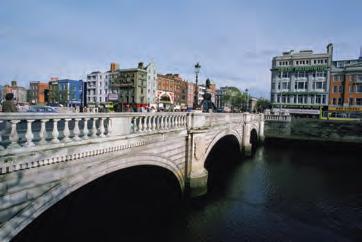

Complete the following sentences with the correct article. Leave the gap blank if an article is not needed. 1. ___ football they play in ____America is different from ____ game they play in __England. 2. She is studying _____ architecture, and I am sure she will make ____ good architect. 3. Tom arrived at ______ dawn, and left in ______evening. 4. John has quite ______ good collection of ______ stamps. 5. _____ boy over there is ______ worst in _____ class at _____ French. 6. ______ Kazbek is one of ______ highest mountains in ______ Central Asia. 7. I forgot to pay _____ bill, and now _____ gas has been cut off. 8. ____ Dublin is in _____ Irish Republic. 9. _____ life is hard, especially _____ life of _____ artist. 10.We were going to play ______ basketball after _____ dinner. 11.What ______ beautiful shoes you have bought! Dublin 12.He was sent to ______ prison for stealing cars.
79
80 LISTENING
Track 22 New Year’s Eve in Japan Listen to the text and do the following exercises. 1 Complete the sentences in A with their endings in B.
A B
1. Cleaning the house a. 108 times. 2. Osechi is b. to take away poverty and unhappiness. 3. Singing Battle between the Red and the White c. a traditional meal.
Team d. is an important way to start a new year. 4. The watch-bell rings e. has been on the air for 50 years. 5. The purpose of the bell is

2 Answer the following questions. 1. How do Japanese people start the day to welcome a new year? 2. When do they eat the traditional meal? 3. What is osechi made of? 4. What do men hang on the front door? 5. What do Japanese people watch in the evening? 6. What do they listen to at midnight?
Now listen to the text again and check your answers.
LINKING WORDS
HOWEVER / BECAUSE / SO /ALTHOUGH / SO THAT / IN ORDER TO / IN SPITE OF (DESPITE)
Read the short text below and say what the linking words in bold express: purpose, result or
contrast.
Despite the fact that she said she wouldn’t go anywhere for New Year, Sarah liked her friends’ idea of going to a club. She decided to ask her parents for permission, so that she could go, too. Although she knew they didn’t have any money to buy her a new dress, she hoped they would agree to let her go, because they had never refused before. However, the dress still might present a problem even if they allowed her to go.
PRACTICE
Complete these sentences with one of the linking words.
1. I have asked you to come ______________I can explain the situation to you. 2. ____________ get to know him better, she asked him to lunch. 3. ______________ he didn’t like her, he gave her the job. 4. We climbed to the top _______________ we could get a better view. 5. Carol went downtown __________to buy a pair of shoes. 6. _____________ what I said last night, I still won’t go there. 7 _______________ hard she tried, nothing seemed to work.
KEY WORD TRANSFORMATIONS
Rewrite these sentences using the words in bold. 1. I can’t play tennis very well. /good I ________________________________ playing tennis. 2. I can’t say I really like cooking every day. /keen I can’t say ____________________________ every day. 3. They carried on climbing despite such heavy snow. /although They carried on climbing ____________________________ heavily. 4. His handwriting is so small I can hardly read it. /such He has ______________________________ I can hardly read it. 5. If you stop smoking, you will feel much better. /give You’ll feel much better if _________________________.
COMMUNICATION
EXPRESSING GOOD WISHES
Look at some wishes which usually appear on greetings cards at Christmas, New Year and on other occasions.
Expressing good wishes on a special occasion
We wish you a Merry Christmas and a Happy New Year. A very Happy New Year to you. Happy birthday/Anniversary! Many happy returns (of the day)!
Expressing general good wishes
I wish you every success! All the best! Have a good/nice time! I hope everything goes well!
Responding to good wishes
Thank you very much. Thanks. You too.
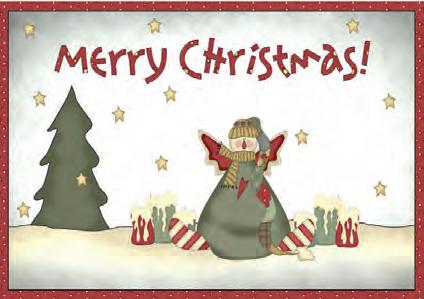
WRITING

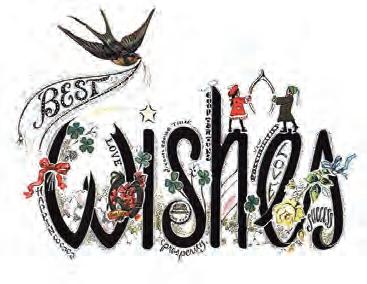
Write a greetings card with best wishes for your friend for the occasion you have chosen. You may find the above expressions useful.






